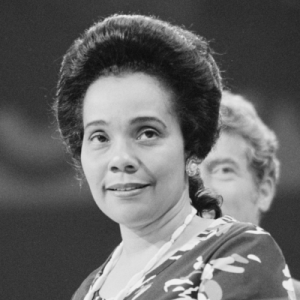Coretta Scott King

Although best known for being the wife of famed civil rights leader Dr. Martin Luther King Jr., Coretta Scott King created her own legacy in the movement to end injustice. She also worked to continue he husband’s legacy after his death.
Coretta Scott was born in Marion, Alabama on April 27, 1927. King’s parents were both entrepreneurs and her mother was musically talented. As a child, King expressed interest in music and quickly excelled in grade school as lead in the choir. She was the valedictorian in high school and went on to received her BA in music from Antioch College in Yellow Springs, Ohio. King was awarded a scholarship to further her music studies at the New England Conservatory of Music in Boston, Massachusetts. While studying at the school King was introduced to then, doctoral student Martin Luther King Jr. Although she was not initially attracted to him, the two began to date, and married in 1953.
One year later King graduated from the Conservatory of Music and the couple moved to Montgomery, Alabama. Martin took a position as the pastor of Dexter Avenue Baptist Church. The church became a center for the Civil Rights Movement in Alabama and eventually the country. Due to her family’s participation in the movement King often received death threats. As a result, the couple’s house was a continuous target for white supremacist groups. Throughout her marriage, King appeared side by side with her husband fighting against injustice. She also openly criticized the movement’s exclusion of women. The Kings had four children. Often when Martin was travelling Coretta remained at home, managing a full household on her own.
Dr. Martin Luther King Jr. was assassinated on April 4th, 1968 in Memphis, Tennessee. King continued to support several issues, marching in a labor strike only days after his funeral. She openly expressed disdain for the Vietnam War, an action that placed her under FBI surveillance for several years. King also supported several women’s right causes. She travelled internationally, lecturing about racism and economic issues in the United States and abroad. In 1969, King was awarded the Universal Love Award, becoming the first non-Italian to hold the distinction. The same year, she published her memoirs entitled My Life with Martin Luther King Jr.
King established the King Center, a memorial which focused on protecting and advancing her husband’s legacy. Her hard work eventually materialized in a federal holiday in honor of Dr. Martin Luther King Jr., which was signed into law in 1983. Although she later passed the leadership of the King Center on to her son Dexter, King remained an integral part of the organization, accepting speaking engagements and appearances until her death. King died on January 30th, 2006 from complications due to ovarian cancer. Her funeral was attended by several presidents and heads of states who expressed their sadness in losing another prominent figure in the fight for equality. She is buried alongside her husband in Atlanta, Georgia.
- King, Coretta. My Life, My Love, My Legacy. New York: Holt & Co, 2017
- “About Mrs.King,” The King Center, Accessed by 27 April 2017.
- “Interview with Coretta Scott King,” Eyes on the Prize II Interviews, Accessed 27 April 2017.
- PHOTO: Library of Congress
MLA – Norwood, Arlisha. "Coretta Scott King." National Women's History Museum. National Women's History Museum, 2017. Date accessed.
Chicago- Norwood, Arlisha. "Coretta Scott King." National Women's History Museum. 2017. www.womenshistory.org/education-resources/biographies/coretta-scott-king.




